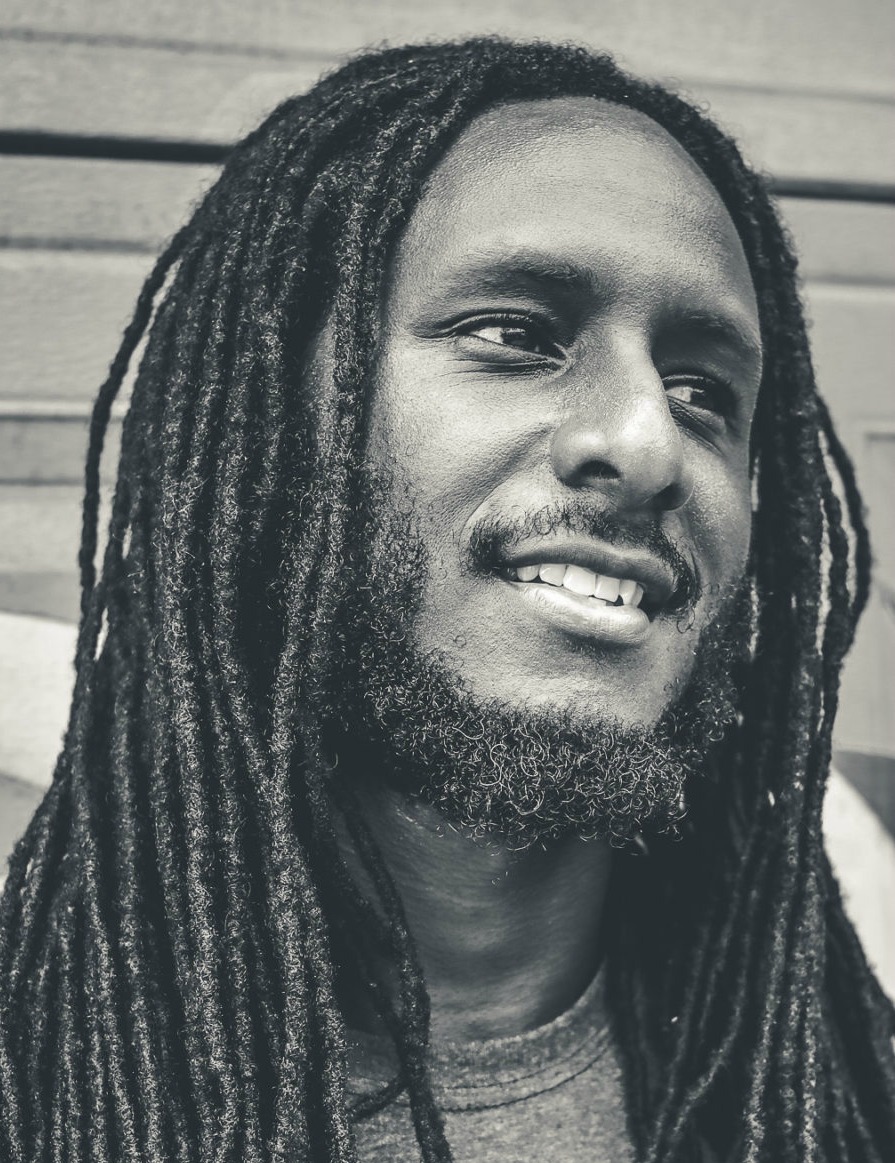
Michael Quess Moore a.k.a. A Scribe Called Quess (photo by: Fernando Lopez)
The first time we scheduled to meet with Michael Quess? Moore, a stoplight fell on his car. And, yes, I’m being literal in that sentence. The second time, he showed up in a cast. Nothing about everyday existence for this educator, poet, and activist seemed, well…everyday.
Yet, his poetry scopes in on the everyday. Examines it. Challenges it.
As he opened up his reading at the Dogfish Reading Series, he began with his poem that states, “We need to have a conversation about race.”
Race, gentrification, education, displacement, poverty, politics, sexuality, inequality, death, and other topics people would describe as “challenging,” or “difficult,” or “not an easy conversation to have,” act as centrifugal forces, circling around Quess’s poetry. These topics are everyday conversations for those who are brave enough to have them, and they pull and tug and intertwine the meaning of words that Quess creates.
He is a poet and an artist, so acknowledging and announcing threats is part of the deal. As he explains, “An artist is always charged to come into the room and say or do those things that the rest of the human village or community is not saying or doing. We’re always the crazy one on the outskirts of the village, and we got to come back to the center of the village with this thing we found on the outskirts and be brave enough to say, ‘Hey winter is coming!'”
Artists put themselves in danger when they carry the news, which others may be trying to ignore, and plop it down in the center of the proverbial dinner table. There is a type of “blood letting,” as Quess describes it, that poets must do when they get before a crowd. Their poetry is founded on observations and experiences that have shadowed stories behind them, and they take these shadows and hope for enlightenment with those who may stare, or snap, or grimace, or smile from the crowd.
“I always want to give as much as I’m available for,” Quess says, “yet, at the same time, I like to think about the nature of the crowd or the size of the crowd.” That night at the Dogfish Reading Series he used the phrase “awkward sauce” throughout his readings. It made sense. There was a comfortable and polite tension in the air as the predominantly white crowd watched the “cisgendered African-American male,” as he described himself, take the stage.
The crowd moved, sipped their wine from plastic cups, ate off their paper plates, and finished their side conversations. Then Quess started reading. There was stillness and polite silence as he let each of his written and spoken words introduce and unfold the next. But, as the night continued, more snaps, more call-outs, and more reactions started to occur.
Something was being built between Quess and the 40+ strangers in the room. That something brought about ephemeral responses of “hmm” and shouts of agreement when Quess dug into and questioned why educators for kids of color are not teachers of color. When Quess quotes economist Milton Friedman who said that “Katrina was a tragedy, but also an opportunity to radically reform the New Orleans public schools,” he follows that line up with an emphatic “that’s bullshit.” Then he falls into an unstoppable, fast-paced poetic justification as to why Friedman’s arguments are as problematic as his intentions, and the audience eagerly walks that word path with Quess.
“We have to sit in the same place and have a conversation with each other enough so that we can work past the awkward sauce,” Quess says. Because then, we can “work toward the reality that this thing is toxic because…Those things sit there and fester to the point where inequity fortifies itself,” Quess explains. And if that fortification continues to move through our streets, our policies, and our veins, “It turns into more than toxicity. People’s lives get lost.”
“If we want to avert that cataclysm again,” Quess says, there is something we need to do. “Talk.”
Michael Quess? Moore will be the keynote speaker on January 11 at the New Orleans Public Library’s MLK activities. He will also be introducing keynote speaker Brie Newsome at the Greater New Orleans Fair Housing Action Center MLK activities on January 12. You can learn more about Michael Quess? Moore, A Scribe Called Quess?, as well as his poetry on his website, and you can also follow him on Facebook, Instagram, and Twitter.
Michael Quess? Moore also has the following coming up:
 NOLAbeings
Multimedia artist Claire Bangser created NOLAbeings as a portrait-based story project that marries...
NOLAbeings
Multimedia artist Claire Bangser created NOLAbeings as a portrait-based story project that marries...
 Data corner: Adobe Suite (create a PDF, social media graphic, presentation, edit a photo and video
Data corner is where you go to work with analytics and top tech skills. It takes on everything from PERL and SQL to Canva and Sprout Social.
Data corner: Adobe Suite (create a PDF, social media graphic, presentation, edit a photo and video
Data corner is where you go to work with analytics and top tech skills. It takes on everything from PERL and SQL to Canva and Sprout Social.
